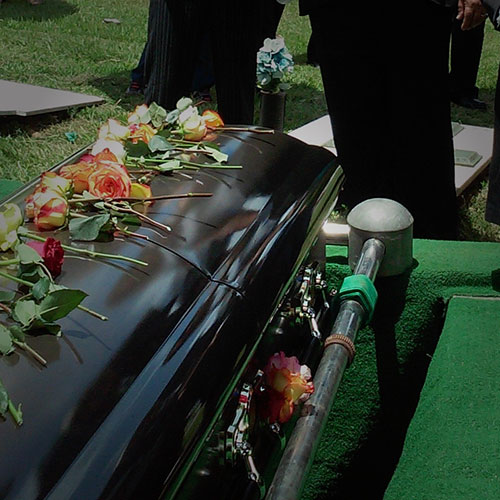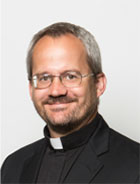 The life of a parish priest affords a unique vantage point – not just on developments within the Church, but also on movements in society. It is quite amazing what you can pick up on as a priest as you make your rounds of home visits, pastoral calls, work with the poor and being present in moments of grief. If you listen carefully, you can discern quite a bit about the state of our world and society.
The life of a parish priest affords a unique vantage point – not just on developments within the Church, but also on movements in society. It is quite amazing what you can pick up on as a priest as you make your rounds of home visits, pastoral calls, work with the poor and being present in moments of grief. If you listen carefully, you can discern quite a bit about the state of our world and society.
Some of these movements are hope-filled while others, sadly, are troubling. A trend I find troubling is a cheapening (for lack of a better word) of the funeral experience and ritual. I believe this cheapening testifies to a growing impoverishment of the human spirit.
There are some understandable factors as to why Catholic funerals are falling out of favor: the cost of funerals and the commercialization of the funeral industry, our society’s unease with death, the reality of families being spread out and therefore not in as much contact and conversation, the increasing use of cremation, the growing number of non-Catholic spouses or other family members who are not familiar with Catholic rituals and customs. These are honest realities that should be acknowledged.
Yet there are other choices made regarding funerals that I do believe are unnecessary and, in fact, diminish the meaningfulness and benefits of a funeral and prayers for the deceased in a family’s grieving process. Some people choose to forego all things “Catholic” for a funeral because they are not Catholic or have left the Church, even though the deceased was Catholic and was sincere in practicing his or her faith. In a similar vein, some choose not to have a funeral Mass or do anything at the parish church but rather have a service just at the funeral home or graveside in order to simplify things for everyone, and sometimes even to skirt around the possibility of offending someone who may be out of sorts with the Church. Some choose to forego a Catholic funeral in favor of more contemporary approaches often offered through the funeral business. In our consumer mentality, we sometimes only attach value to something if we have to spend money on it and if it seems flashy.
As a priest, I am particularly saddened when it is apparent that the deceased loved ones and family did not choose a Catholic funeral simply because they are no longer Catholic or they want to make things easier for themselves. This does happen – more and more so.
I am saddened both for the departed who, in life, found great comfort in his or her Catholic faith, and I am saddened for those left in their grief. I know they are missing an important opportunity to be nourished by the beauty and hope found in the Catholic funeral celebration. The Catholic funeral Mass – and all of the Church’s beautiful rituals surrounding the end of life – speak to us on many levels about the purpose of one’s life, God’s plan of salvation and the hope of eternal life, and how to handle the inevitability of grief and loss in our lives.
If there is a word that I think of in relation to the Catholic funeral, it is “commend.” In the Catholic funeral – from wake to funeral Mass to graveside committal – we commend our loved one into the mercy of God and we also commend ourselves, praying for God’s comfort and peace in a time of loss. From the choices of readings and hymns to the rubrics for each aspect of the liturgical service, the Church offers insights and guidance on what is appropriate to perform this ritual that commends the loved one to God’s mercy. This structure of the ritual is not meant to deny or diminish the loved one or her or his life in any way.
A “celebration of life” (a popular expression these days) is all well and good, but such a celebration ends at the grave and can go no further. The Catholic funeral, however, in its depth of meaning and symbolism, reminds us that the grave has been overcome not by our wishing it so, but by the death and resurrection of Christ our Lord. The Catholic funeral reminds us and brings us into this greater and more important context because only the resurrection of Christ conquers the tomb, only the resurrection of Christ says death is not the final word, only the resurrection of Christ gives the true hope that comforts and heals us in our sorrows.
No person likes to think about death, but I encourage people to at least reflect on the beauty and meaning of the Catholic funeral and let your loved ones know your desires and wishes. Many parish offices can even help people plan out how they wish their funeral to be celebrated, and this information can be kept on file. In the end, the Church has no legal way to compel people to celebrate a loved one’s funeral in a particular way, even if there is information is on file at the parish office, but making one’s desires known and even keeping it on file at the church can be of valuable assistance during what is an emotional, very difficult time.
And it is important. A funeral should respect who a person is, and a person’s faith tradition is an essential component of who we are and the hope we have as Christians.
Beyond the funeral Mass, our Catholic faith has a wonderful tradition of having Masses offered for our dearly departed. This tradition is rooted in our firm belief in the Resurrection. In the Resurrection of Christ, death has been overcome – and just as we pray for one another while here on Earth, so too we can assist our loved ones who have died with our prayers, and they can also pray for us. The Mass offered for a deceased loved one is a way that the Church gathered offers prayers for a loved one as he or she is brought into the beatific vision – full life with God. Yes, we can pray for our deceased loved ones, and it is important to do so. Scripture often testifies to the power of the prayers of the gathered community. If you wish to have a Mass offered for a loved one, contact your parish office. It is a holy thing to do and a spiritual act of mercy.
 So, why is a Catholic funeral important? The Catholic funeral is at the heart of who we are as Church – a people gathered, saved and redeemed by Christ our risen Lord. It is a witness to a secular world that there is a greater context to both life and death, given our relationship with God as our Father and Creator. A Catholic funeral speaks to the hearts of the people gathered and might even convert hearts that might be hurting or searching.
So, why is a Catholic funeral important? The Catholic funeral is at the heart of who we are as Church – a people gathered, saved and redeemed by Christ our risen Lord. It is a witness to a secular world that there is a greater context to both life and death, given our relationship with God as our Father and Creator. A Catholic funeral speaks to the hearts of the people gathered and might even convert hearts that might be hurting or searching.
With His death and resurrection, Christ has conquered the tomb. Thanks to the gift of His Church and its poignant funeral rituals, we can put death in its proper perspective and gain a deeper understanding of our life’s ultimate purpose and the hope of eternal life with our Creator.
— Father Michael Cummins is a priest of the Diocese of Knoxville, Tenn. Ordained in 1995, he serves as pastor of St. Dominic Church in Kingsport, Tenn. He holds a Masters of Divinity and Licentiate in Sacred Theology from the University of St. Mary of the Lake (Mundelein Seminary) in Chicago. He has a deep interest in Christian anthropology and the interaction between faith and culture. This article originally appeared on Word on Fire, online at www.wordonfire.org.


